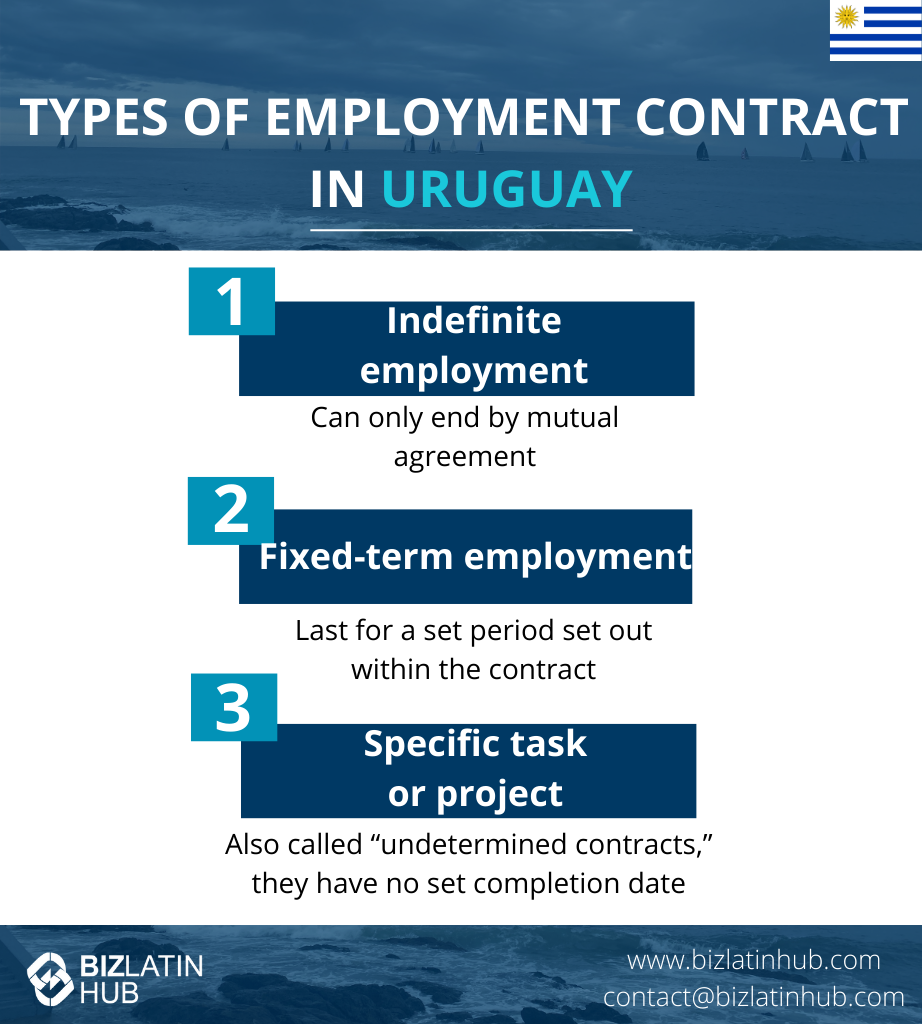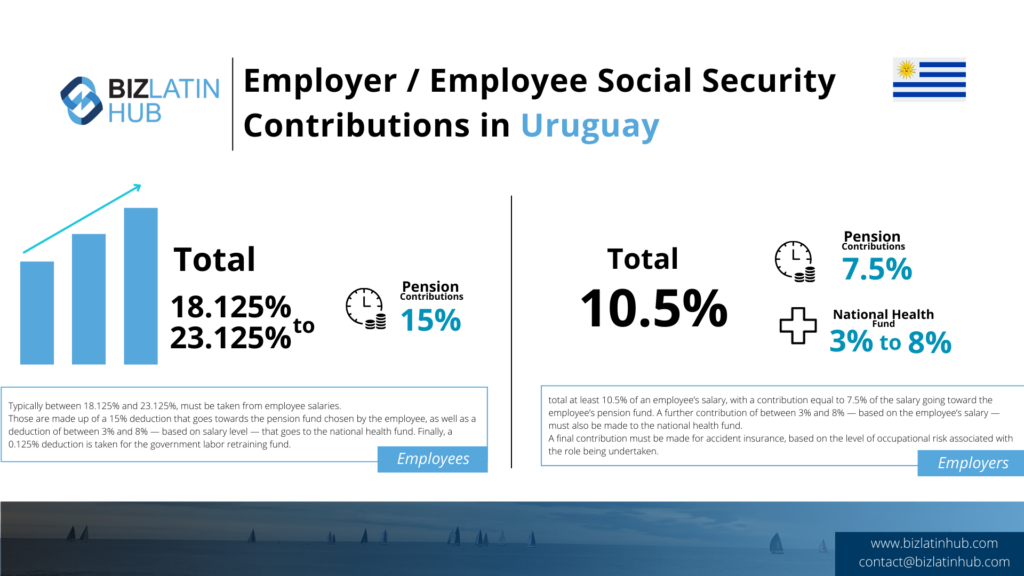Uruguay’s employment laws are regulated by the Labor Code and provide clear protections for workers. This 2025 guide outlines contract types, work hours, benefits, and termination rules for businesses operating in Uruguay. This is critical to set up a business in Uruguay.
Key Takeaways
| What are the working hours mandated by employment law in Uruguay? | Employment law in Uruguay sets a maximum work schedule of 8 hours per day and 48 hours per week, not including overtime. |
| What is the minimum wage in Uruguay? | The current monthly minimum wage as of January 2025 is $U23,604 (aprox USD$545). |
| Types of Employment Contracts in Uruguay | Fixed-term. Indefinite-term. Project contracts. |
| What percentage of an employee’s salary is contributed to social security in Uruguay? | Employer contributions total at least 10.5% of an employee’s gross salary. |
Overview of Labor Law in Uruguay
Types of Employment Contracts
There are three main contract types used by foreign companies and investors by the employment law:
Indefinite contracts

These are the most common type of contract used in Uruguay, and can only be terminated when the employee and employer reach a mutual agreement or when one of the parties can act unilaterally, such as if the employee resigns or the employer has just cause to terminate the contract.
Fixed-term and probationary contracts
These last for a set period set out within the contract. That can be any period lasting days, weeks, or months, but generally would not exceed one year.
Specific task or project contracts
Also known as an “undetermined contact”, these have no specific or clear date for when the task or project will be completed. That means that clear makers or thresholds must be set out to eliminate any doubts or ambiguities regarding the completion of the project.
Working Hours, Overtime, and Paid Leave
According to employment law in Uruguay, a standard working week lasts for between 44 and 48 hours, based on the type of work being undertaken, with working days being no longer than eight hours long, meaning that all employees should have at least one day off per week.
Supplementary hours must be remunerated accordingly, based on the average rate earned during normal hours.
Note that in Uruguay there are usually between eight and 10 national holidays that fall on weekdays per calendar year.
According to employment law in Uruguay, after 12 months of service with the same employer, an employee is entitled to 15 days of paid vacation leave, which must be taken within the following 12 months.
After five years of employment, an employee gains one additional day of paid vacation per year. After that, one additional day of seniority leave is added to their allowance for every subsequent four years worked.
- Sick leave: Employers are obliged to pay an employee’s salary for the first 3 days of work missed due to illness, however, it must be authorized by a registered doctor. From the third day onwards, the employee’s salary will be covered by the government social security fund.
- Maternity and paternity leave: Maternity leave allowance totals 13 weeks, and can begin between one and six weeks before the due date, with the remainder taken after the child’s birth. Paternity leave totals 10 working days. In both cases, salary costs associated with this leave are covered by the government social security fund.
- Marriage leave: Under employment law in Uruguay, employees are entitled to three days of paid leave when they get married, of which one of the days should coincide with the marriage itself if it is being held on a normal working day. Note that an employee must provide at least 30 days of notice to be entitled to marriage leave, and must also provide documentary evidence of the marriage afterward to be paid for the days of absence.
- Bereavement leave: Employees are entitled to three working days of bereavement leave in the event of a parent, child, spouse/civil partner, or sibling passing away. Legal documentation offering proof of the death must be presented within 30 days of that leave being taken, and failure to present such documentation will result in that leave being discounted from the employee’s annual allowance.
- Study leave: Employment law in Uruguay states that after completing six months of service with the same employer, an employee is entitled to paid leave to participate in an educational course. The leave allowance is based on how many hours they work per week and is set out as follows:
- Under 36 hours per week: six days of leave per year
- Over 36 hours but under 48 hours per week: nine days of leave per year
- Working 48 hours per week: 12 days of leave per year.
Note that this leave cannot last for more than three consecutive days at a time.
- Gynecological examination leave: Female employees are entitled to one day of paid leave per year to undertake a gynecological and/or mammary examination, however, evidence of the appointment must be provided.
- Blood donation: Employees are entitled to one day of paid leave per year for blood donation, for which they must provide evidence.

According to employment law in Uruguay, the following deductions from employee salaries and contributions from employers must be made:
- Employee deductions, typically between 18.125% and 23.125%, must be taken from employee salaries.
Those are made up of a 15% deduction that goes towards the pension fund chosen by the employee, as well as a deduction of between 3% and 8% — based on salary level — that goes to the national health fund. Finally, a 0.125% deduction is taken for the government labor retraining fund.
Note that the minimum wage according to employment law in Uruguay was set at $U23,604 (approx USD$545) in 2025. - Employer contributions total at least 10.5% of an employee’s salary, with a contribution equal to 7.5% of the salary going toward the employee’s pension fund. A further contribution of between 3% and 8% — based on the employee’s salary — must also be made to the national health fund.
A final contribution must be made for accident insurance, based on the level of occupational risk associated with the role being undertaken.
| Category | Employer Obligations | Employee Rights |
|---|---|---|
| Work Week | Max 44 hours (commercial) or 48 hours (industrial) | Weekly rest and paid holidays |
| Written Contracts | Must be signed and registered with Ministry of Labor | Legal protection via documented terms |
| Social Contributions | Pay into BPS (social security), health fund, pension | Healthcare, pension, maternity/paternity leave |
| Paid Leave | 20 working days after 1 year of service | Paid vacation and bonus (vacation salary) |
| Termination | Pay notice, severance, accrued benefits if dismissed | Severance based on tenure and salary |

Termination, Notice, and Severance Pay
Termination of an employee in Uruguay does not have any legal requirements. Fair dismissal in Uruguay does not require any justification, but severance indemnity must be paid. There is no obligation for a notice before dismissal in Uruguay. Unfair dismissal in Uruguay is not legally defined.
The severance pay is calculated as one month’s salary for each year worked, with a maximum of six months’ salary. This includes holiday pay, benefits, commissions, and aguinaldo (yearly bonus). While there is no specific requirement for employees to give notice of resignation, employers must provide one day’s written notice. The typical notice period for both the employee and employer in Uruguay is 1.5 weeks.
FAQs about employment law in Uruguay
In our experience, these are the common questions and doubtful points of our clients.
Employees in Uruguay work eight hours a day and 48 hours per week. Overtime work on a working day is compensated at double the regular salary. Additionally, work on public holidays or non-working days is compensated at two and a half times the employee’s regular compensation. It is important to note that in Uruguay, the probationary period lasts for three months.
Working conditions in Uruguay include a standard work week of 48 hours in industry and 44 hours in commerce. Workers in both sectors are required to have a minimum rest period of 36 hours per week and are compensated for any excess hours worked. Additionally, all workers are entitled to a minimum of 20 days of paid vacation per year. It is important to note that the national retirement age in Uruguay is 60. All this is overseen by the ministry of labor.
The standard workweek is 44 hours for commercial work and 48 hours for industrial sectors, typically spread across 5 or 6 days depending on the industry and contract type.
Overtime in Uruguay is paid at double the normal rate on working days and at two and a half times the normal rate on non-working days. The maximum limit for overtime is 8 hours per week.
If dismissed without just cause, employees are entitled to:
Advance notice or indemnity in lieu
Severance compensation based on seniority and salary
Unpaid vacation and proportional annual bonus (aguinaldo)
Employees in Uruguay are entitled to severance payments when they resign. The severance pay is calculated as one month’s salary for each year worked, with a maximum of six months’ salary. This includes holiday pay, benefits, commissions, and aguinaldo (yearly bonus). While there is no specific requirement for employees to give notice of resignation, employers must provide one day’s written notice. The typical notice period for both the employee and employer in Uruguay is 1.5 weeks.
Yes. All employment contracts must be in writing, signed by both parties, and registered with the Ministry of Labor and Social Security (MTSS).
Employees are entitled to 20 working days of paid vacation per year after completing one full year of continuous employment. They also receive a vacation bonus equal to 100% of the normal salary for the vacation period.
Employers must contribute to:
BPS (Banco de Previsión Social – social security and pensions)
FONASA (public health insurance system)
Labor accident insurance via the Banco de Seguros del Estado
Total employer contributions typically amount to around 30–33% of an employee’s gross salary.
No. Foreign companies must either establish a local legal entity or engage a compliant Employer of Record (EOR) in Uruguay to legally hire staff.

Biz Latin Hub can assist you in understanding the employment law in Uruguay
At Biz Latin Hub, our multilingual team of corporate support experts is available to help you understand and fully implement employment law in Uruguay.
We offer tailored packages of integrated back-office services to suit every need, with a portfolio that includes company formation, visa processing, accounting & taxation, legal services, and hiring & PEO.
As well as Uruguay, we have teams in place in 15 other markets around Latin America and the Caribbean, meaning that we can help you effectively manage your taxes across multiple markets, and provide multi-jurisdictional market entry support.
Contact us today to find out more about how we can support you in doing business in Uruguay.
Or learn more about our team and expert authors.






